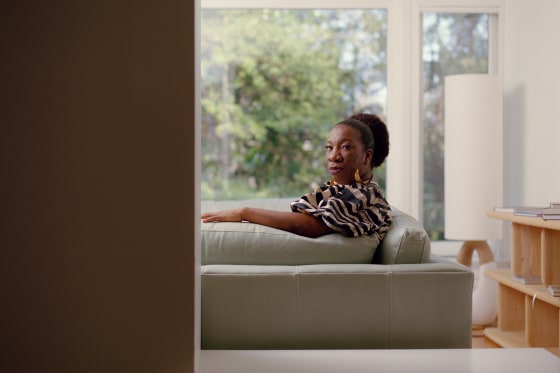Long before the #MeToo hashtag went viral in 2017, Tarana Burke spent years tackling racial injustice, gender inequity and violence issues.
It was while doing youth development work with Black girls, and hearing numerous accounts of sexual abuse, violations and exploitation — stories that resonated as a sexual assault survivor herself — from which the initial “Me Too” movement emerged.
But after many years as an advocate, Burke was unexpectedly propelled into the spotlight in fall 2017, when sexual abuse allegations against Hollywood producer Harvey Weinstein exploded. After actress and activist Alyssa Milano encouraged social media followers to tweet “#Me Too” to signal past sexual harassment or assault, the tremendous response also brought Burke’s pioneering efforts to light.
“I could never envision when this all began that a global movement would happen,” Burke said. “That people would take to the streets. I didn’t think people cared enough.”
The surge of attention catapulted her and fellow survivors into the spotlight. In 2017, Time magazine named “The Silence Breakers” as its Person of the Year; Burke was among the women. In 2018, she was a special guest at the Academy Awards, the Golden Globes and Essence magazine’s Black Women in Hollywood luncheon. That same year, she landed on Time’s list of the 100 Most Influential People. In 2019, she was one of the recipients of the Sydney Peace Prize.
While motherhood and her activism with one of the largest movements of the 21st century keep her busy, Burke found time to pen a memoir (her second book), which was released in September. Titled “Unbound: My Story of Liberation and the Birth of the Me Too Movement,” it was published under Oprah Books, an imprint of Flatiron publishers.
A third-generation New Yorker raised in public housing in the Bronx borough, Burke has said she was sexually assaulted at age 7. She reeled from the assault, believing she was responsible and said her “soul split in two.” On one side was a bright, intellectually curious girl steeped in Black literature and power. On the other was a girl who was ridden with shame, thinking of herself as a “vile” rule-breaker, not a victim. The competing emotions, hidden behind a wall of pain and anger, fractured her soul.
“There’s a myth that as you grow older it gets better, but I’m still healing from my childhood wounds,” she said. What has helped, she explained, is utilizing her platform to uplift others, some of whom may be living with the pain, shame and trauma of their experiences in isolation.
In 2006, Burke launched Just Be Inc., an organization committed to the empowerment and wellness of Black girls. She soon began using “Me too” as language to help survivors heal and develop as leaders, and that work launched her into global recognition years later. In 2018, Burke founded me too. International, a nonprofit group that extends the work of speaking out against sexual violence among the movement into marginalized communities.
She described the organization as “a convener, innovator, thought leader, and organizer across the mainstream and the grassroots.” The team works toward dismantling “the proliferation of sexual violence, specifically in Black, queer, trans, disabled, and all communities of color.”
According to the National Center on Violence Against Women in the Black Community, 1 in 4 Black girls will be sexually abused before the age of 18 and 1 in 5 Black women are survivors of rape. The Institute for Women’s Policy Research reports that more than 20 percent of Black women are raped during their lifetimes — a higher share than among women overall.
“It used to be that no one was really talking about Black and brown women, indigenous women and sexual abuse,” Burke said. “Rarely did you hear the words ‘healing’ or ‘survivor.’ We are at least having conversations.”
Indeed, high-profile cases against Weinstein, comedian Bill Cosby (who was found guilty of indecent assault in 2017 and later released from prison due to a technicality) and singer R. Kelly, among others, have heightened dialogue, but Burke said greater awareness is still needed.
Specifically, the me too. International group seeks to promote empowerment through an “empathy” movement, aimed at supporting survivor healing, and interrupting sexual violence through community action.
“It’s important that we don’t let other people affect the narrative, or co-opt the movement,” Burke said.
In October, the me too. International group celebrated the movement’s past and present with a series of events deemed #BeyondTheHashtag. The events were designed to cultivate joy and wellness to help survivors on their path forward. The organization also announced a partnership with the Global Fund for Women to end sexual violence and gender-based violence in developing nations.
“The movement to disrupt rape culture and end sexual violence is happening across borders, fueled by brilliant practitioners committed to survivor justice in their communities,” Dani Ayers, CEO of me too. International said in a statement.
Lori Adelman, vice president of influence and engagement for the Global Fund for Women added, “Western feminists have a way of dominating the global discourse, so it’s important to note that feminists around the globe have been organizing around sexual and gender-based violence.”
Yet, Adelman noted, grassroots activists, particularly those in developing nations, are often doing so without the benefit of connection and solidarity, and on a shoestring budget. “What wins could be unlocked if organizers could more easily share learnings, resources and information with each other, and access better resources to sustain this work?”
Burke agrees. Her vision, and the collective vision of the organization, is paving a way forward for people to heal and live free from harm.
“Activist Joanne Smith said: ‘We’ve come to the work, because we are the work.’ It just describes exactly why we’re here, and why we stay,” she said. “I am this work. It brought me here and it keeps me here.”
